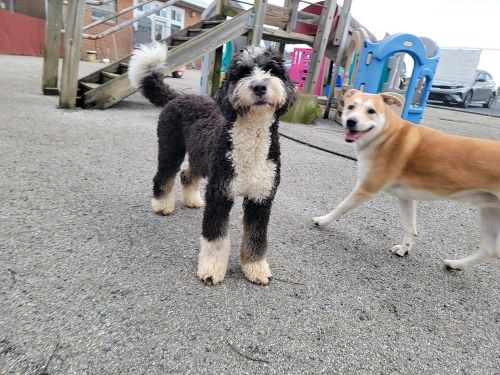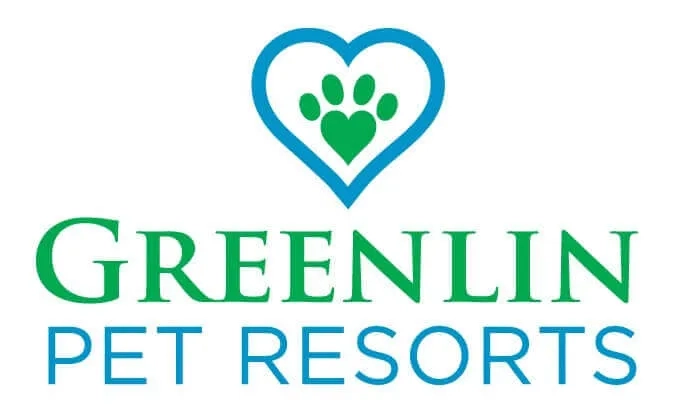The Role of Play in Dog Socialization

When people picture their life with a puppy, they imagine sweet cuddles on the couch, long walks through the neighborhood, dog training sessions, and some play. However, though it may not be the most notable thing an owner thinks of when planning for their new furry family member, play with humans and other animals is extremely important to dogs, puppies, and more mature dogs alike.
Like many people, dogs are social animals, and as such they love to spend time with both other dogs as well as people. When spending time with other dogs, pups will use play as a way to communicate, learn, and grow.
Play is something that is deeply rooted in dogs; they have an instinct to do it, and as such, it has aided in their evolution to this point.
Sure, it’s cute when puppies are playing. But apart from it being an opportunity to make fun memories or take cute pictures or fun videos, why is play so important to dogs, especially when it comes to their socialization?
How Dog Play Aids Socialization
As mentioned above, dogs are social creatures and enjoy being around people and other pups. Play gives your puppy a chance to learn boundaries, which is a vital life skill for your dog. In addition to learning boundaries, play provides many rich learning opportunities for pups.
However, though dogs have an instinct to play, they do not necessarily understand how to interact with new dogs when meeting them for the first time.
Though you can and should play with your dog at home, allowing your dog to interact with other dogs, such as at a dog park or at doggy daycare, can add an extra layer of enrichment to your dog’s cognitive development. Through play, dogs can learn many things, such as the following.
Social Skills
In play with other dogs, your pup can interact with other canine companions, which is essential when trying to socialize your pup. While they are playing, they can begin to figure out what behavior is acceptable to other dogs.
Dogs can begin to figure out if they are being too rowdy, dominant, or even submissive, which helps them fine-tune their behavior so they can live harmoniously with others. For instance, if they are playing with another dog and nipping them, the reaction of the other dog will teach them what level of force is and isn’t acceptable.
Playing with humans can also help your dog develop these skills.
Cognitive Growth
Even if dogs are just playing with their owners, there are many skills that can be learned through play. Games that you play with your dog provide them with mental challenges, which can keep them engaged and not bored.
Hiding treats around the house for them to find, for example, stimulates their prey and tracking drives while giving them a chance to stay familiar with their space. Playtime, even if it’s just rolling a ball on the floor and having them chase it, allows your puppy to develop their problem-solving skills and helps them to develop their cognitive functions.
Building Confidence
Taking your dog to the dog park to play can help your dog build confidence as they interacts with a wide range of breeds and sizes of dogs. Being around so many different types of dogs can help your dog become adept at reading different situations and adjust their behavior accordingly, which can range from being playful with one another to situations where your dog may need to assert themselves.
Improve Physical Health
While all forms of exercise are necessary and important for your dog’s wellbeing, playing with other dogs offers a different way to move their bodies than more structured exercises, such as walks. While playing with or chasing other dogs, your dog’s body will move in more unpredictable ways, which can help develop their agility, flexibility, strength, and overall fitness.
Diminish Stress
Like people, dogs have the ability to feel stress, and playing with other dogs offers your dog a chance to alleviate some of that stress. Just as with their owners, social interactions and physical exertion can be a way to get rid of any stress that dogs are holding on to.
Role of Play in Dogs as They Age
As dogs age, their exact needs for play and socialization change. While social interaction and physical exertion are important at any age, it is best to tailor approaches to the dog’s changing social and physical needs.
Puppy Play
Before puppies even leave their mothers, they still have important skills to learn. A puppy’s first days and weeks are critically important, as these experiences can influence the rest of their lives.
Puppies should expose their senses to stimuli, especially sounds, smells, and even textures, to set them up for future social interactions. At this time, puppies are still with their siblings and can begin to learn boundaries and interaction through play.
Adolescent Play
As puppies get older and move into their adolescent phase, they may grow adventurous and try to test their limits. This phase is marked by your pup becoming more curious and assertive and is a great time to reinforce any training that you have done with your pup up until this point.
This training can help ensure that your pup interacts appropriately both with dogs and people. This stage of life is a great time to expose your dog to many different types of surroundings, which allows them to practice adapting to various situations and helps them build confidence in themselves.
Adult Play
Once your pup grows into an adult, its energy levels will typically settle to more manageable levels. However, that does not change the fact that your pup still needs plenty of consistent socialization opportunities.
Regular play-dates or interactions with other dogs can ensure that your dog remains sociable. This period of time is also a great time for you to train your dog further with any specialized skills or dog games, as these are additional opportunities for you to provide mental engagement and structured social outings to your dog.
Senior Play
Though your dog may begin slowing down physically, their spirits have not disappeared. Though it may take a little more consideration, providing your senior dog with opportunities to play is a good way to ensure they still feel connected.
When planning play dates for your senior dog, try finding calmer or younger dogs that your dog is familiar with. You can also provide your dog with toys that have different textures or toys that reward them with treats to keep them happy and engaged as they age.
Some Fun Dog Socialization Activities to Try
Dog socialization can and should be a fun time for all. It’s a great way to spend time with your pet while helping them work on skills that are vital at any age.
The next time you and some human or furred friends are around your dog, try participating in these fun activities that encourage play while enhancing socialization.
- Rewarding Recall Practice — “Recall” refers to the act of the dog coming to someone when they call the dog’s name. Most dogs are better about recall when called by someone familiar, so work on this skill by having other friends and family call the dog from different areas of the yard, offering praise or a tasty treat, before having someone else call the dog to a different area.
- Stimulation Participation — Recall and other commands can be much trickier in a distracting environment. Try working on these commands or just enjoying time with your pup while listening to music or engaging in other activities like sitting around a fire. These activities tend to stress some dogs or make them less likely to respond, so having attention devoted to them in the midst of all the stimulation can help improve confidence and obedience.
- Scavenger Hunt — Have someone other than the pet’s main owner hide treats in the house, around the yard, or in easy-to-reach public places on the regular walk route. That person can then supervise the dog or hold their leash while helping the dog track down every last treat. This improves bonding with others while stimulating their drive for hunting and discovery.
- Catch and Release — Dogs have different comfort levels when it comes to petting and snuggles. While their boundaries should be respected, it is also important to dull their reaction to hugs and other forms of attention so that they can improve their comfort with other people overall as they age. One fun way to work on this is to engage in high-energy play followed by downtime, where the dog is held closely or pet while being on a short leash until it calms down, followed by a return to fetch or running. Alternating play in this way teaches them that both modes are good at different times while helping them transition more easily from one to the other.
Contact Greenlin Pet Resorts for Fun and Socialization in One
Whether you are looking for an opportunity for your dog to attend doggy daycare, learn new skills through dog training, or if you need a place for your pet to stay while you travel, look no further than Greenlin Pet Resorts. With six locations in the central Pennsylvania area, we offer a variety of services to help ensure that your pup leads a happy and healthy life.
- Greenlin East
- Greenlin West
- Greenlin Lambs Gap
- Greenlin Camp Hill
- Greenlin Hershey
- Greenlin Harrisburg
Give us a call today to set up a time to come tour one of our facilities or meet with one of our experienced employees. We can’t wait to help you learn about all the services we have available for you and your furry family member.
We look forward to talking with you, answering any questions you may have, and welcoming you and your dog to the Greelin Family!
